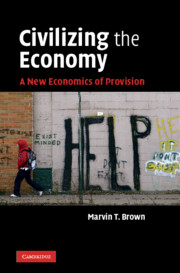Book contents
- Frontmatter
- Contents
- List of figures
- List of tables
- Preface
- 1 Introduction: creating a just and sustainable economy
- Part I Creating a new economic framework
- Part II The civic option
- Part III A civic view of labor, land, and money
- Part IV Civilizing economic systems
- 12 A world of systems
- 13 Imagining a stakeholder economy
- 14 The ethics of economic systems
- 15 Changing systems of provision
- Part V A civic agenda
- Appendix: Free enterprise and the economics of slavery
- Bibliography
- Index
15 - Changing systems of provision
Published online by Cambridge University Press: 05 June 2012
- Frontmatter
- Contents
- List of figures
- List of tables
- Preface
- 1 Introduction: creating a just and sustainable economy
- Part I Creating a new economic framework
- Part II The civic option
- Part III A civic view of labor, land, and money
- Part IV Civilizing economic systems
- 12 A world of systems
- 13 Imagining a stakeholder economy
- 14 The ethics of economic systems
- 15 Changing systems of provision
- Part V A civic agenda
- Appendix: Free enterprise and the economics of slavery
- Bibliography
- Index
Summary
When we sit down to dinner at home or in a café, it is easy to ignore the source of the food we eat, how it got to the table, or the providers that grew, harvested, prepared, and served it. Still, the food on our plate has a history, perhaps like Rifkin's tale of the English muffin discussed in Chapter 13. If we are to understand how to evaluate and to improve systems of provision, sometimes we need to think about the sub-systems within them and the other systems with which they interact. In this chapter, we will look at three systems of provision: food, transportation, and housing. Our purpose here is not to definitively answer the many questions we face about how to organize our economic life, but rather to demonstrate how an economics of provision adds to the conversations about the changes we need to make for a more just and sustainable economy.
The systems of food, transportation, and housing provide basic human needs – nutrition, access, and shelter. Others may be equally important, but these three are central to any civic economy, and today they must function in a world that is suffering from the impoverishment of natural and human providers. To begin thinking about how to change these conditions, we can return to the picture of the stakeholders of systems of provision that we developed in the previous chapter.
- Type
- Chapter
- Information
- Civilizing the EconomyA New Economics of Provision, pp. 193 - 206Publisher: Cambridge University PressPrint publication year: 2010



